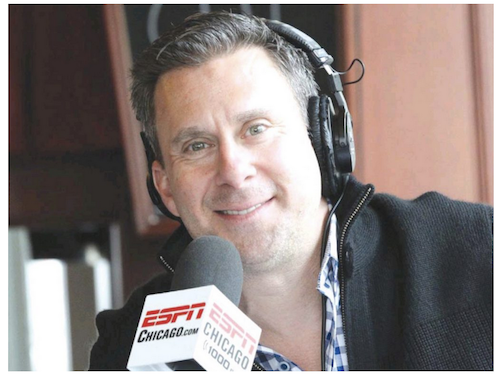Media – June 2020
Marc Silverman was already having a tough go of it, trying to do a sports talk radio show (Waddle & Silvy, afternoons, ESPN Radio AM 1000) in a time with no live sports, when he began to suspect there might be something wrong with his health.
“I didn’t really have any symptoms. I wasn’t feeling sick. But my lymph nodes were getting swollen, and once the one in my groin got swollen, that’s when I said ‘OK I gotta go get this checked out by a doctor,’ and that’s when the whole thing started.”
He has been diagnosed with Stage 3 Non-Hodgkins Lymphoma.
“You’re sitting in a pandemic thinking e-learning is tough. You’re doing sports-talk radio in a time when there are no games. And you’re struggling with two young kids, and then suddenly, you look at your life and think, “Boy I had it pretty good.’”
Talking to him now is like talking to Dr. Silverman (“probably not the only ‘Dr. Silverman’ out there,” he joked), because he has thoroughly researched his illness and what lies ahead for him.
“As a reporter, as someone who likes to ask questions for a living, I immersed myself in the information and began to ask a million questions. I began googling the others I knew who had similar things, like Merril Hoge, Anthony Rizzo, Jon Lester, Craig Sager, and I just read all there was to read. The doctors always said, ‘Don’t Google’, but you can tell me that all you want—I’m not gonna stop. I learned a lot. For instance, there’s a difference between cancer stages in those that have tumors and those that have blood cancer as I have. For my kind of cancer, the difference between Stage 2 and Stage 3 is that Stage 2 is either above or below the diaphragm, in one section of the body. Stage 3 is what I have because I have it in my neck and my groin, above and below the diaphragm. Yes, it has spread, but it wasn’t in my bone marrow, and it wasn’t in my organs, which is huge. They say this is a very treatable form of this cancer.”
Silverman is in the midst of that treatment right now.
“I’m doing a clinical trial—immunotherapy—and they think this will further improve the situation, in addition to the chemotherapy. So far, I have good doctors, good friends, a good environment, and I feel great about it. It will basically take five months for the entire treatment. I’m scheduled to complete it by the beginning of September. “
He plans to continue working throughout the treatment, although he will have to play that by ear. For the time being, he will be doing it from home.
“Before the diagnosis, I was coming into the studio, but I asked my doctor about it after I was diagnosed, and he said absolutely 1000% you should be [working] from home. Luckily, my bosses have been understanding, and the technology is there now to do it relatively seamlessly, so it hasn’t been an issue. And (Tom) Waddle and I have been doing the show together for 13 years. At this point, we can complete each other’s sentences.”
The team has been together for 13 years, but Silvy’s time at this station goes back even further. He has been there since 1998.
“That’s true. I can’t believe it’s been that long,” he says. “The first meeting we had in 1998 at AM 1000 was in the Bulls locker room. We didn’t know if Michael was coming back or retiring, and our first meeting was assembled there. We wondered how long we could last; if we could co-exist with the Score, and my boss Mitch told me not to buy a place to live — he said I should rent. Not exactly a confidence-builder. To be sitting here 22 years later, I almost can’t believe it. I have had incredibly good fortune.”
Speaking of the Bulls, I wondered how he felt about the recently completed The Last Dance, considering he had been there as a reporter when it first went down.
“It was refreshing to see the other side of Michael,” he says. “Back in the day, Michael was the most politically correct press conference guy in the world. He was so polished. He wouldn’t even do an interview with his shirt off. The only time you would ever get him was after the game, with his suit on, either in front of his locker or at a podium. Now, in The Last Dance, we see him with a glass of scotch or tequila next to him, smoking a cigar, unleashing F-bombs, and being totally unfiltered — that’s a completely different perspective than we got from interviewing him during that time.”
Perspective is something Silverman has in spades these days.
“When you’re in a real battle with a real thing like cancer, you realize what is important. What’s important is the people around you; the people I’ve met, including our great listeners who have reached out to me, their outpouring really touched me. Not to mention the people I work with and my family and friends. I don’t care what people think of me as a broadcaster. When all is said and done, if they say I’m a good guy who had lots of friends, and cared about people and treated them well, then that’s the most important thing to me.”
–Rick Kaempfer










